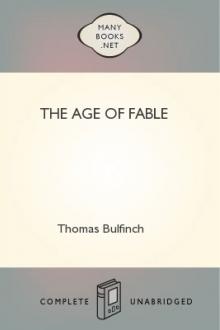Bulfinch’s Mythology, Thomas Bulfinch [love story books to read txt] 📗

- Author: Thomas Bulfinch
Book online «Bulfinch’s Mythology, Thomas Bulfinch [love story books to read txt] 📗». Author Thomas Bulfinch
When the queen was informed by her husband that it was the celebrated Ogier the Dane whom he presented to her, whose memorable exploits she had often read in the chronicles of antiquity, her surprise was extreme, which was increased when she remarked the dignity of his address, the animation and even the youthfulness of his countenance. This queen had too much intelligence to believe hastily; proof alone could compel her assent; and she asked him many questions about the old court of Charlemagne, and received such instructive and appropriate answers as removed every doubt. It is to the corrections which Ogier was at that time enabled to make to the popular narratives of his exploits that we are indebted for the perfect accuracy and trustworthiness of all the details of our own history.
King Hugh Capet, having received that same evening couriers from the inhabitants of Chartres, informing him that they were hard pressed by the besiegers, resolved to hasten with Ogier to their relief.
Ogier terminated this affair as expeditiously as he had so often done others. The Saracens having dared to offer battle, he bore the Oriflamme through the thickest of their ranks; Papillon, breathing fire from his nostrils, threw them into disorder, and Cortana, wielded by his invincible arm, soon finished their overthrow.
The king, victorious over the Saracens, led back the Danish hero to Paris, where the deliverer of France received the honors due to his valor. Ogier continued some time at the court, detained by the favor of the king and queen; but erelong he had the pain to witness the death of the king. Then it was that, impressed with all the perfections which he had discerned in the queen, he could not withhold the tender homage of the offer of his hand. The queen would perhaps have accepted it, she had even called a meeting of her great barons to deliberate on the proposition, when, the day before the meeting was to be held, at the moment when Ogier was kneeling at her feet, she perceived a crown of gold which an invisible hand had placed on his brow, and in an instant a cloud enveloped Ogier, and he disappeared forever from her sight. It was Morgana, the fairy, whose jealousy was awakened at what she beheld, who now resumed her power, and took him away to dwell with her in the island of Avalon. There, in company with the great King Arthur of Britain, he still lives, and when his illustrious friend shall return to resume his ancient reign he will doubtless return with him, and share his triumph.
Glossary A Abdalrahman(Ab-dal-rahˈman), founder of the independent Ommiad (Saracenic) power in Spain, conquered at Tours by Charles Martel.
Aberfraw(Abˈer-fraw), scene of nuptials of Branwen and Matholch.
Absyrtus(Ab-syrˈtus), younger brother of Medea.
Abydos(A-byˈdos), a town on the Hellespont, nearly opposite to Sestos.
Abyla(Abˈy-la), Mount, or Columna, a mountain in Morocco, near Ceuta, now called Jebel Musa or Ape’s Hill, forming the Northwestern extremity of the African coast opposite Gibraltar. See Pillars of Hercules.
Acestes(A-cesˈtes), son of a Trojan woman who was sent by her father to Sicily, that she might not be devoured by the monsters which infested the territory of Troy.
Acetes(A-ceˈtes), Bacchanal captured by Pentheus.
Achates(A-chaˈtes), faithful friend and companion of Aeneas.
Achelous(Ach-e-loˈus), river-god of the largest river in Greece—his Horn of Plenty.
Achilles(A-chilˈles), the hero of the Iliad, son of Peleus and of the Nereid Thetis, slain by Paris.
Acis(Aˈcis), youth loved by Galatea and slain by Polyphemus.
Acontius(A-conˈti-us), a beautiful youth, who fell in love with Cydippe, the daughter of a noble Athenian.
Acrisius(A-crisˈi-us), son of Abas, king of Argos, grandson of Lynceus, the great-grandson of Danaüs.
Actaeon(Ac-taeˈon), a celebrated huntsman, son of Aristaeus and Autonoë, who, having seen Diana bathing, was changed by her to a stag and killed by his own dogs.
Admeta(Ad-meˈta), daughter of Eurystheus, covets Hippolyta’s girdle.
Admetus(Ad-meˈtus), king of Thessaly, saved from death by Alcestis.
Adonis(A-doˈnis), a youth beloved by Aphrodite (Venus), and Proserpine; killed by a boar.
Adrastus(A-drasˈtus), a king of Argos.
Aeacus(Aeˈa-cus), son of Zeus (Jupiter) and Aegina, renowned in all Greece for his justice and piety.
Aeaea(Ae-aeˈa), Circe’s island, visited by Ulysses.
Aeetes(Ae-eˈtes), or Aeeta, son of Helios (the Sun) and Perseis, and father of Medea and Absyrtus.
Aegeus(Ae-geˈus), king of Athens.
Aegina(Ae-giˈna), a rocky island in the middle of the Saronic gulf.
Aegis(Aeˈgis), shield or breastplate of Jupiter and Minerva.
Aegisthus(Ae-gisˈthus), murderer of Agamemnon, slain by Orestes.
Aeneas(Ae-neˈas), Trojan hero, son of Anchises and Aphrodite (Venus), and born on Mount Ida, reputed first settler of Rome.
Aeneid(Ae-neˈid), poem by Virgil, relating the wanderings of Aeneas from Troy to Italy.
Aeolus(Aeˈo-lus), son of Hellen and the nymph Orseis, represented in Homer as the happy ruler of the Aeolian Islands, to whom Zeus had given dominion over the winds.
Aesculapius(Aesˈcu-laˈpi-us), god of the medical art.
Aeson(Aeˈson), father of Jason, made young again by Medea.
Aethiopians(Ae-thi-oˈpi-ans), inhabitants of the country south of Egypt.
Aethra(Aeˈthra), mother of Theseus by Aegeus.
Aetna(Aetˈna), volcano in Sicily.
Agamedes(Agˈa-meˈdes), brother of Trophonius, distinguished as an architect.
Agamemnon(Agˈa-memˈnon), son of Plisthenis and grandson of Atreus, king of Mycenae; although the chief commander of the Greeks, is not the hero of the Iliad, and in chivalrous spirit altogether inferior to Achilles.
Agave(A-gaˈve), daughter of Cadmus, wife of Echion, and mother of Pentheus.
Agenor(A-geˈnor), father of Europa, Cadmus,





Comments (0)